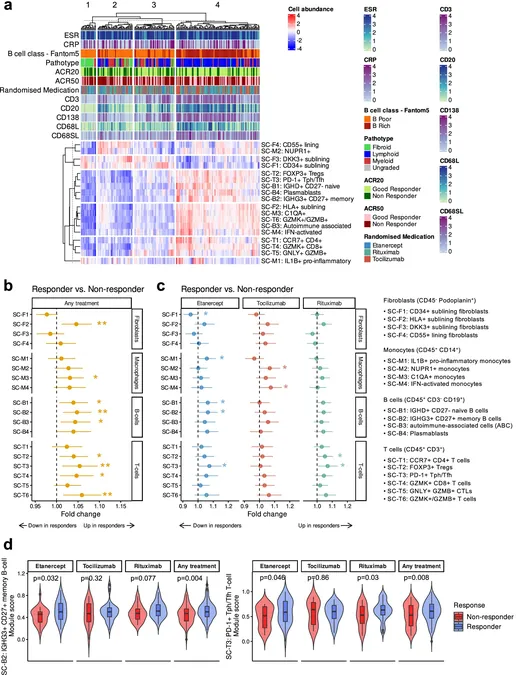
Revolutionary Test Predicts Optimal Rheumatoid Arthritis Treatment in One Go!
2025-07-03
Author: Ming
1 in 100 Britons Battle Rheumatoid Arthritis
In Britain, a staggering 1 in 100 individuals grapples with rheumatoid arthritis (RA). Unlike the wear-and-tear issues of osteoarthritis, RA is a merciless autoimmune disease where the body mistakenly attacks its own joints, making it a formidable foe for anyone, particularly those between the ages of 40 and 60.
Are Current Treatments Enough?
Biological therapies have emerged as front-runners in managing this chronic condition. These innovative treatments utilize engineered proteins derived from living cells to outsmart the immune system by targeting its rogue elements. Over the last two decades, these therapies have dramatically improved the lives of countless RA patients.
However, the fight against RA is not straightforward. With around a 40% failure rate, patients often find themselves trapped in a labyrinth of treatments—each tailored to their unique genetic makeup. The absence of a clinical diagnostic test means many endure numerous failed therapies, increasing their risk of severe side effects and infections due to immune system suppression.
Breakthrough Prediction Technology!
Enter Professors Costantino Pitzalis and Myles Lewis of Queen Mary University of London, who have engineered a groundbreaking method to predict how patients will respond to the three primary RA biological therapies. This revolutionary approach could critically enhance treatment selection and eliminate the guesswork.
Using a process known as deep molecular phenotyping, the team analyzes a small biopsy from the patient's affected joint. Unlike prior methods that relied on blood samples—a strategy now deemed inadequate—the new technology accurately assesses patients' genetic responses.
From Biopsies to Breakthroughs
The procedure begins with the extraction of RNA from a tissue sample, studying the activity of 524 genes to unravel the biological mystery within the patient’s cells. By running this data through machine learning models linked to the three major therapies—etanercept, tocilizumab, and rituximab—the researchers are able to predict which treatment could offer the best chance of success.
This predictive prowess could vastly improve patient outcomes. Should the model indicate that none of the conventional therapies are suitable, clinicians can pivot to alternative treatment options, significantly optimizing patient care.
Promising Results and Future Endeavors
According to Prof. Myles Lewis, the quest to predict patient responses has long eluded researchers. While previous studies identified potential biomarkers, none achieved clinical approval—until now. "We’ve discovered unique gene expressions in patients who responded to treatment versus those who didn’t," he explains.
By harnessing this data, the predictive models achieved an accuracy rate of 79% to 85%, providing hope where once there was only uncertainty.
A Transformative Approach for Patients
Prof. Costantino Pitzalis highlights the substantial promise this innovation holds for both patients and healthcare systems. Correctly prescribing the right treatment on the first attempt could alleviate suffering and enhance healthcare efficiency. Conversations with potential commercial partners are already underway to bring this revolutionary approach to clinical settings.
With a clinical trial in motion, this team of trailblazers is poised to introduce the first predictive test into mainstream medicine, marking a monumental step forward in the fight against rheumatoid arthritis.


 Brasil (PT)
Brasil (PT)
 Canada (EN)
Canada (EN)
 Chile (ES)
Chile (ES)
 Česko (CS)
Česko (CS)
 대한민국 (KO)
대한민국 (KO)
 España (ES)
España (ES)
 France (FR)
France (FR)
 Hong Kong (EN)
Hong Kong (EN)
 Italia (IT)
Italia (IT)
 日本 (JA)
日本 (JA)
 Magyarország (HU)
Magyarország (HU)
 Norge (NO)
Norge (NO)
 Polska (PL)
Polska (PL)
 Schweiz (DE)
Schweiz (DE)
 Singapore (EN)
Singapore (EN)
 Sverige (SV)
Sverige (SV)
 Suomi (FI)
Suomi (FI)
 Türkiye (TR)
Türkiye (TR)
 الإمارات العربية المتحدة (AR)
الإمارات العربية المتحدة (AR)